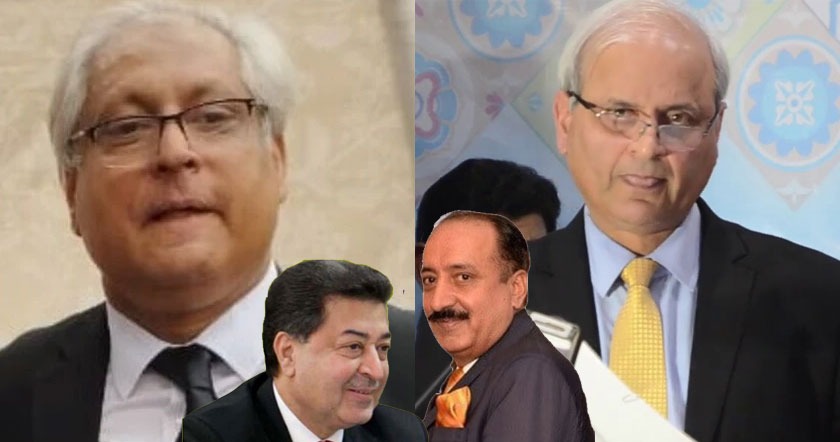A British firm has launched a Sharia-compliant pension fund that will
enable Muslims to save for retirement in compliance with Islamic
principles.
The British government will begin offering Muslim workers Sharia-
compliant pensions as of 2012. The launching of the funds, which are
said to be structured around a strict code of ethics and based on the
Muslim Koran and Islamic Sharia law (a religious code for living),
reflects the gradual establishment of parallel Islamic financial and
legal systems in British public life.
Pointon York, an independent financial services company based in
Leicestershire in central England, announced on June 6 that it will
begin offering four Sharia-compliant Self-Invested Personal Pensions
(SIPP) products that do not bear interest nor invest in companies that
trade in alcohol, gambling, pornography, tobacco or weapons, in
conformity with Islamic law.
Pointon York is the first specialist SIPP provider to receive Sharia-
compliant accreditation by the Islamic Bank of Britain (IBB), which
has pioneered Islamic retail banking in the United Kingdom. The IBB
will supervise the entire lifecycle of Pointon York's pension funds to
ensure full compliance with Sharia legal principles.
In 2012, the British government will begin offering Muslim workers a
Sharia-compliant pension fund in the public sector. A new government
agency, the National Employment Savings Trust (NEST), will give
Muslims who do not already have a company pension the option of
investing in the HSBC Life Amanah Pension Fund, a Sharia-compliant
pension scheme.
NEST initiated the procurement process for a Sharia-complaint global
equity fund in January 2011, by means of a tender which generated
proposals from funds across Europe. In April, NEST announced that it
had appointed HSBC, a huge global banking and financial services
company headquartered in London, to run the Islamic portfolio. The
initial target market comprises some 200,000 Muslims in Britain.
Muslim families in Britain can already acquire Sharia-compliant baby
bonds under the British government's Child Trust Fund scheme. In 2008,
Britain's Financial Services Authority (FSA) authorized the
establishment of the country's first Islamic insurance company as well
as the country's first Sharia MasterCard, called the Cordoba Gold
MasterCard.
The new financial products are seeking to fill the growing demand for
Sharia-compliant financial products in Britain in the wake of Muslim
mass immigration to the country.
The United Kingdom is home to an estimated 2.8 million Muslims, which
is equivalent to about 4.6 percent of the overall population. In
absolute terms, Britain has the third largest Muslim community in
Europe, after Germany (4.1 million, 5.0 percent) and France (3.6
million, 5.7 percent.) According to a recent survey conducted by the
Washington, D.C.-based Pew Research Center, the Muslim population in
Britain is forecasted to nearly double to 5.5 million within the next
20 years.
Little surprise, then, that Islamic banking is growing faster in
Britain than it is in many Islamic countries in the Middle East and
Asia. According to the "Global Islamic Finance Report 2011," Britain
has emerged as ground zero for Islamic banking in Europe; and London
is now the main center for Islamic finance outside the Muslim world.
With $19 billion in reported Islamic banking assets, Britain's Islamic
finance sector ranks number one in Europe, and number nine in the
world. It dwarfs those sectors of some states where Islam is the main
religion, including Pakistan, Bangladesh, Turkey and Egypt, according
to a new report titled "The City UK Islamic Finance 2011."
More than 20 banks in Britain now offer Islamic finance products and
there are five fully Islamic banks in the country. In addition, there
are 55 colleges and professional institutions offering education in
Islamic finance in Britain more than anywhere else in the world.
The establishment of Britain as a global center for Islamic finance is
being promoted by the British government, which has extended tax
relief on Sharia-compliant mortgages to companies and has eased the
trade in Islamic bonds known as Sukuk. There were five Sukuk listings
at the London Stock Exchange (LSE) in 2010 and one in early 2011,
bringing the aggregate total at the LSE to 31 listings worth nearly
$20 billion.
The growth of Islamic finance comes as other aspects of Sharia law are
becoming enshrined in the British legal system. At least 85 Islamic
Sharia courts are now operating in the country, almost 20 times as
many as previously believed. A recent study by the London-based
Civitas think tank titled "Sharia Law or 'One Law for All'?" found
that scores of unofficial tribunals and councils regularly apply
Islamic law to resolve domestic, marital and business disputes, many
operating in mosques. It warns of a "creeping" acceptance of Sharia
principles in British law.
The study follows outcry over remarks by the Archbishop of Canterbury,
Dr Rowan Williams, who has argued that adopting parts of Islamic
Sharia law would help maintain social cohesion in Britain. He also
said: Sharia law in Britain is "unavoidable."
Somewhat belated efforts are now being made to push back against the
spread of Sharia in Britain. Under a new bill introduced in the House
of Lords, the lower chamber of the British Parliament, on June 7,
Islamic courts would be forced to acknowledge the primacy of English
law.
The Arbitration and Mediation Services (Equality) Bill would make it
an offense punishable by five years in jail for anyone falsely
claiming or implying that Sharia courts or councils have legal
jurisdiction over family or criminal law. The bill, which would apply
to all arbitration tribunals if passed, aims to tackle discrimination,
which its supporters say is inherent in the courts, by banning the
Sharia practice of giving woman's testimony only half the weight of
men's.
The bill, proposed by Lady Caroline Cox-Johnson, and backed by women's
rights groups and the National Secular Society, was drawn up because
of "deep concerns" that Muslim women are suffering discrimination
within closed Sharia law councils. Cox said she had found
"considerable evidence" of women, some of whom are brought to Britain
speaking little English and kept ignorant of their legal rights,
suffering domestic violence or unequal access to divorce, due to
discriminatory decisions made. "We cannot continue to condone this
situation. Many women say: 'We came to this country to escape these
practices only to find the situation is worse here.'"
The bill challenging Sharia law will be viewed as a declaration of war
by many Muslims who view the institutionalization of Islamic law as a
key component of their political strategy of Islamifying the West. In
the words of Imam Abdullah al-Hasan of the East London Mosque: "Islam
is here to stay in Britain."
enable Muslims to save for retirement in compliance with Islamic
principles.
The British government will begin offering Muslim workers Sharia-
compliant pensions as of 2012. The launching of the funds, which are
said to be structured around a strict code of ethics and based on the
Muslim Koran and Islamic Sharia law (a religious code for living),
reflects the gradual establishment of parallel Islamic financial and
legal systems in British public life.
Pointon York, an independent financial services company based in
Leicestershire in central England, announced on June 6 that it will
begin offering four Sharia-compliant Self-Invested Personal Pensions
(SIPP) products that do not bear interest nor invest in companies that
trade in alcohol, gambling, pornography, tobacco or weapons, in
conformity with Islamic law.
Pointon York is the first specialist SIPP provider to receive Sharia-
compliant accreditation by the Islamic Bank of Britain (IBB), which
has pioneered Islamic retail banking in the United Kingdom. The IBB
will supervise the entire lifecycle of Pointon York's pension funds to
ensure full compliance with Sharia legal principles.
In 2012, the British government will begin offering Muslim workers a
Sharia-compliant pension fund in the public sector. A new government
agency, the National Employment Savings Trust (NEST), will give
Muslims who do not already have a company pension the option of
investing in the HSBC Life Amanah Pension Fund, a Sharia-compliant
pension scheme.
NEST initiated the procurement process for a Sharia-complaint global
equity fund in January 2011, by means of a tender which generated
proposals from funds across Europe. In April, NEST announced that it
had appointed HSBC, a huge global banking and financial services
company headquartered in London, to run the Islamic portfolio. The
initial target market comprises some 200,000 Muslims in Britain.
Muslim families in Britain can already acquire Sharia-compliant baby
bonds under the British government's Child Trust Fund scheme. In 2008,
Britain's Financial Services Authority (FSA) authorized the
establishment of the country's first Islamic insurance company as well
as the country's first Sharia MasterCard, called the Cordoba Gold
MasterCard.
The new financial products are seeking to fill the growing demand for
Sharia-compliant financial products in Britain in the wake of Muslim
mass immigration to the country.
The United Kingdom is home to an estimated 2.8 million Muslims, which
is equivalent to about 4.6 percent of the overall population. In
absolute terms, Britain has the third largest Muslim community in
Europe, after Germany (4.1 million, 5.0 percent) and France (3.6
million, 5.7 percent.) According to a recent survey conducted by the
Washington, D.C.-based Pew Research Center, the Muslim population in
Britain is forecasted to nearly double to 5.5 million within the next
20 years.
Little surprise, then, that Islamic banking is growing faster in
Britain than it is in many Islamic countries in the Middle East and
Asia. According to the "Global Islamic Finance Report 2011," Britain
has emerged as ground zero for Islamic banking in Europe; and London
is now the main center for Islamic finance outside the Muslim world.
With $19 billion in reported Islamic banking assets, Britain's Islamic
finance sector ranks number one in Europe, and number nine in the
world. It dwarfs those sectors of some states where Islam is the main
religion, including Pakistan, Bangladesh, Turkey and Egypt, according
to a new report titled "The City UK Islamic Finance 2011."
More than 20 banks in Britain now offer Islamic finance products and
there are five fully Islamic banks in the country. In addition, there
are 55 colleges and professional institutions offering education in
Islamic finance in Britain more than anywhere else in the world.
The establishment of Britain as a global center for Islamic finance is
being promoted by the British government, which has extended tax
relief on Sharia-compliant mortgages to companies and has eased the
trade in Islamic bonds known as Sukuk. There were five Sukuk listings
at the London Stock Exchange (LSE) in 2010 and one in early 2011,
bringing the aggregate total at the LSE to 31 listings worth nearly
$20 billion.
The growth of Islamic finance comes as other aspects of Sharia law are
becoming enshrined in the British legal system. At least 85 Islamic
Sharia courts are now operating in the country, almost 20 times as
many as previously believed. A recent study by the London-based
Civitas think tank titled "Sharia Law or 'One Law for All'?" found
that scores of unofficial tribunals and councils regularly apply
Islamic law to resolve domestic, marital and business disputes, many
operating in mosques. It warns of a "creeping" acceptance of Sharia
principles in British law.
The study follows outcry over remarks by the Archbishop of Canterbury,
Dr Rowan Williams, who has argued that adopting parts of Islamic
Sharia law would help maintain social cohesion in Britain. He also
said: Sharia law in Britain is "unavoidable."
Somewhat belated efforts are now being made to push back against the
spread of Sharia in Britain. Under a new bill introduced in the House
of Lords, the lower chamber of the British Parliament, on June 7,
Islamic courts would be forced to acknowledge the primacy of English
law.
The Arbitration and Mediation Services (Equality) Bill would make it
an offense punishable by five years in jail for anyone falsely
claiming or implying that Sharia courts or councils have legal
jurisdiction over family or criminal law. The bill, which would apply
to all arbitration tribunals if passed, aims to tackle discrimination,
which its supporters say is inherent in the courts, by banning the
Sharia practice of giving woman's testimony only half the weight of
men's.
The bill, proposed by Lady Caroline Cox-Johnson, and backed by women's
rights groups and the National Secular Society, was drawn up because
of "deep concerns" that Muslim women are suffering discrimination
within closed Sharia law councils. Cox said she had found
"considerable evidence" of women, some of whom are brought to Britain
speaking little English and kept ignorant of their legal rights,
suffering domestic violence or unequal access to divorce, due to
discriminatory decisions made. "We cannot continue to condone this
situation. Many women say: 'We came to this country to escape these
practices only to find the situation is worse here.'"
The bill challenging Sharia law will be viewed as a declaration of war
by many Muslims who view the institutionalization of Islamic law as a
key component of their political strategy of Islamifying the West. In
the words of Imam Abdullah al-Hasan of the East London Mosque: "Islam
is here to stay in Britain."


































